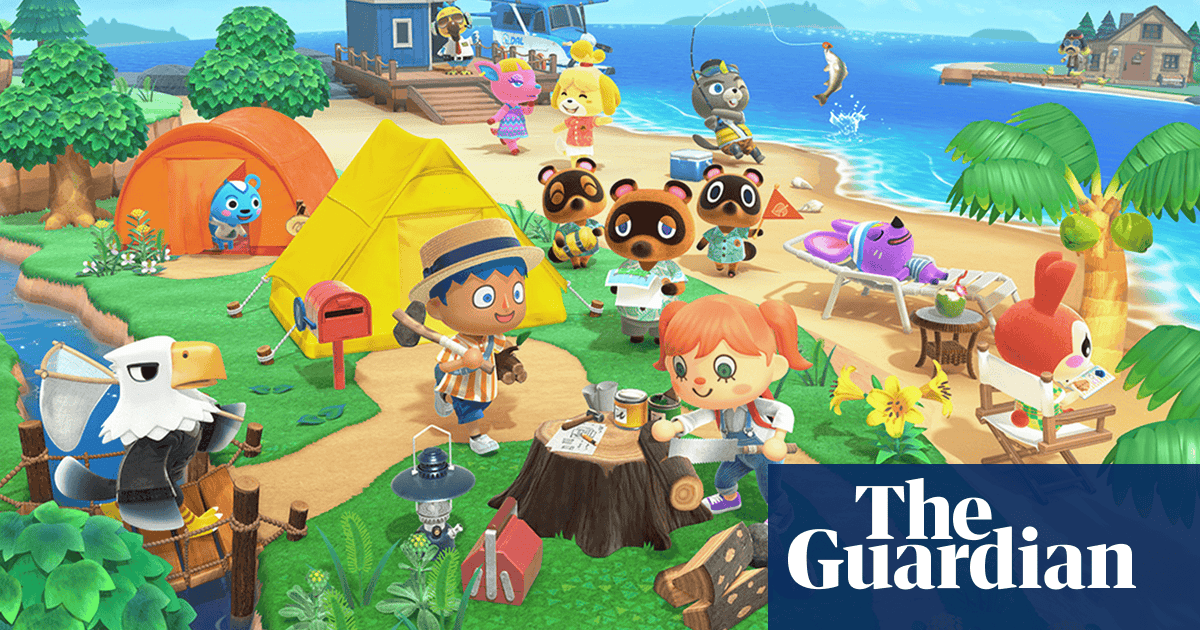‘Today is the first day of your new life on this pristine, lovely island. So, congratulations!” says Tom Nook, the benevolent tanuki landlord, a few minutes into Animal Crossing: New Horizons. (Nook is often besmirched online, but you can’t argue that he’s extremely welcoming.) Many players read this comforting message at a destabilising and frightening time in the real world: Animal Crossing: New Horizons came out on Nintendo Switch on 20 March 2020, a few months into the Covid pandemic and a few days before the UK entered its first lockdown.
This was fortuitous timing. When we were all stuck at home, the game let us plant our native fruits, tend to our flowers and see what the town shop had on offer, repaying our extensive loans (interest-free, thankfully) to Tom Nook as a way of escaping the chaos and daily death tolls. We opened the gates to our islands and welcomed friends and strangers into our pristine little worlds. As real life crumbled, we started anew with bespectacled cats, sheep in clown’s coats and rhinos who looked like cakes.
The game’s sudden popularity caused Nintendo Switch sales to skyrocket among pandemic-induced shortages. New Horizons had sold 44.79 million units by December 2023 – nearly three-and-a-half times more than any other game in the Animal Crossing series, which has been running since 2001. It’s the second best-selling Switch game to date, behind Mario Kart 8 Deluxe.
Player April tells me she and her partner, Matthew, amassed over 700 hours in the game, turning their island into a joint creative project. “We planned the specific themes and items we were going to use, how the neighbourhoods would look, and even the lore behind some of the places and characters,” she says, adding that an in-game party organised by Matthew was one of the best birthdays she’s ever had.
“I’ve never identified as a gamer and it’s the first game since being a pre-teen that I’ve bought and played,” Amy says. “I could see the sense of community it was offering my friends when we couldn’t do things in real life. We had date nights on there, star-gazing, visiting friends and taking photos with people I was very far removed from in reality.”
Many players, including Amy, still play now. She shares the game with her five-year-old niece: “we now play together and I can pass on what I already know and see the fun continue.” She gets to explore Amy’s island, filled with happy memories created over the past four years.
John O’Shea, creative director of the National Videogame Museum, in Sheffield, is massively proud of his team’s work on the Animal Crossing Diaries, a digital exhibition aiming to document the impactful and memorable moments experienced by players during worldwide lockdowns. O’Shea likens the project to the Science Museum Group collecting key “artefacts” of the Covid era, including the first vial of the vaccine used in a mass immunisation programme.
“In the future, we’ll be able to look at those and say that’s representative of what the pandemic was like. But actually, I think that the Animal Crossing Diaries, as an archive of people’s experiences, gives a fascinating insight into the psychology of that time,” he says.
The entries are deeply personal, and allow us to relive an aspect of the pandemic through someone else’s eyes, from solo Pride festivals, to a 50th birthday party (fancy dress mandatory). In a familiar sentiment, one writer describes how playing helps them to “forget about all the terrible stuff going on right now”. Shivani’s diary entry documents the creation of their island, Bollywood, “to pay homage to my cultural upbringing”. They found the game a creative outlet when India struggled through the pandemic. With travel bans, they hoped Bollywood would enable visiting players to learn about India’s culture.
Other players were inspired to take their Animal Crossing experiences beyond digital boundaries once lockdowns were finally over – such as May Naidoo, who set himself the goal of seeing the real-life counterparts of all 43 pieces of art in Animal Crossing’s in-game museum. Naidoo documented his experience on TikTok, racking up over 1.8 million views on the video marking the challenge complete.
after newsletter promotion
“Completing it [the challenge] has widened my appreciation of art in general, and I’ve been able to see iconic art in person and visit dream countries and cities for the first time,” Naidoo says. “I probably would have never visited some of these places if it wasn’t for this goal. It definitely feels global and in the last few cities I visited, after previous videos have gained attention online, I was able to meet people and make friends in new cities, get invited and privately toured by some museums.”
Naidoo, like others volunteering their stories, feels thankful for the opportunities and experiences gained by playing the game during lockdowns and has taken it with him, long after the world opened up. Others find that talking about the memories stirs a desire to jump back in.
In his book Playing With Reality: Gaming in a Pandemic, journalist Alex Humphreys reflects on the role that video games took on in our lives during Covid. Browsing the Diaries, Humphreys notes the blurred lines between realities: “sometimes the only way of knowing which world they’re talking about is when you see the currency ‘bells’ referenced in the next sentence.” For millions, Animal Crossing became far more than just a game.







